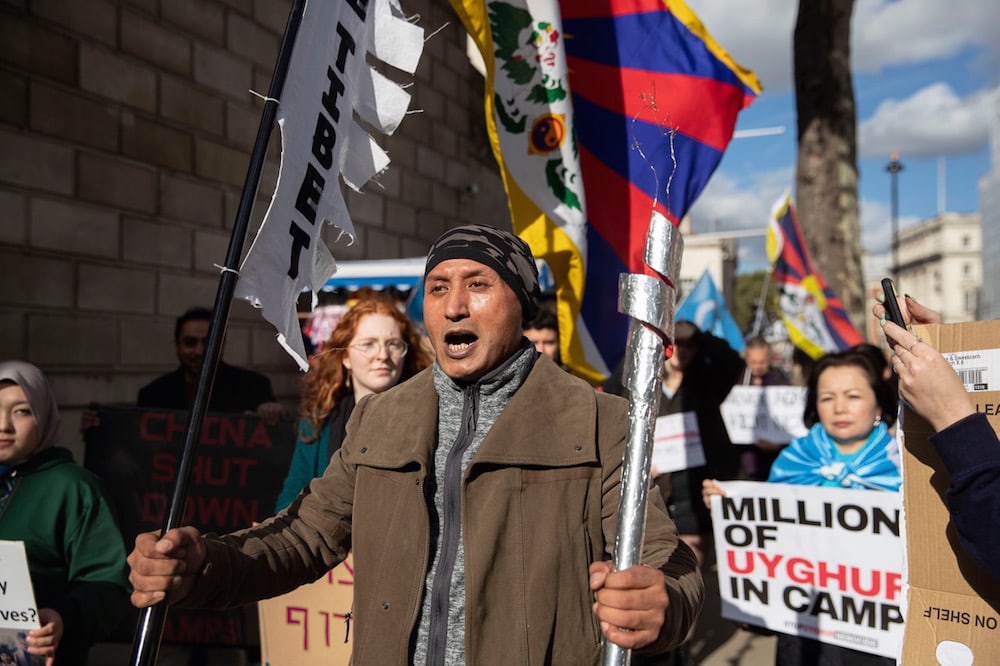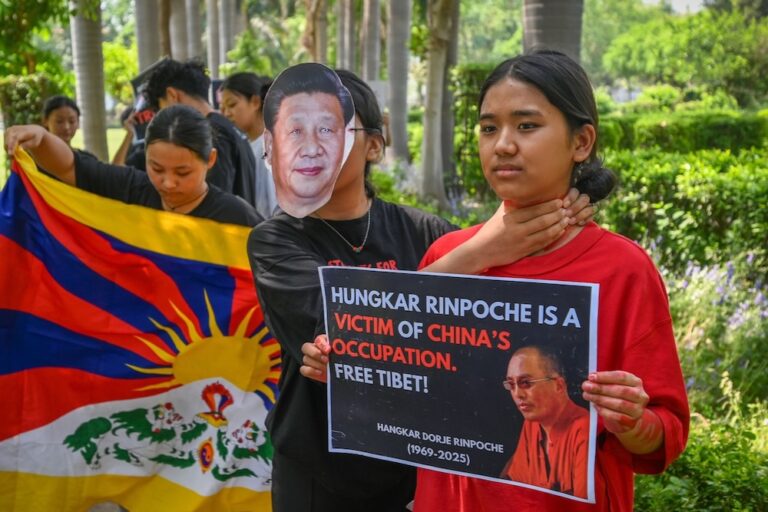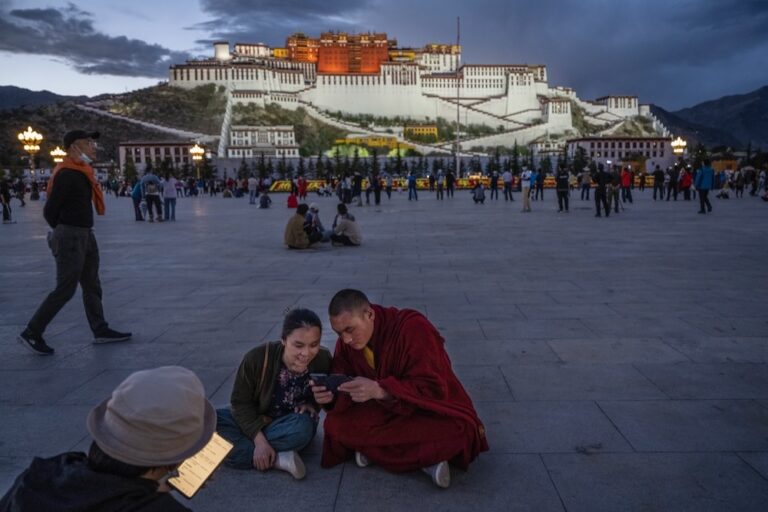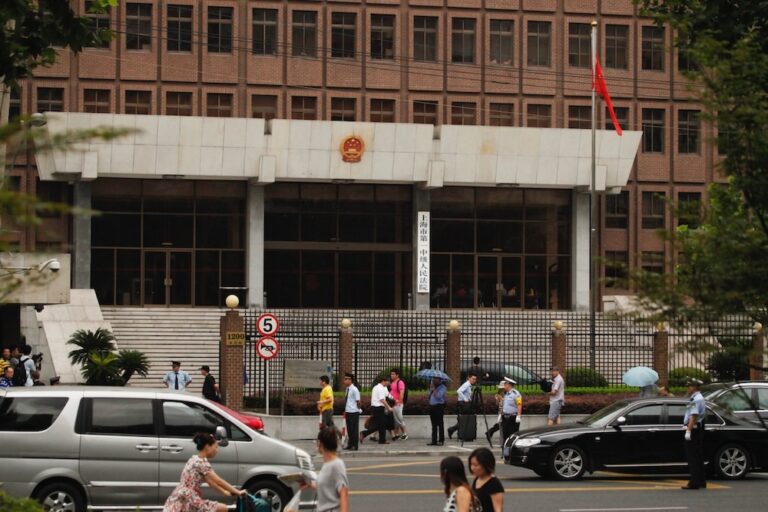An overview of the restrictions and information manipulation imposed by Beijing authorities during the recently concluded Winter Olympics.
The following is an excerpt of Freedom House’s February 2022 China Media Bulletin.
Uyghur athlete selected as Olympic torchbearer: The Chinese government appeared to acknowledge diplomatic boycotts of the Winter Olympics and denunciations of atrocity crimes against Uyghurs by selecting a Uyghur skier to help light the Olympic cauldron during the opening ceremony on February 4. The fate of Uyghurs even with records of government support is precarious: Xinjiang police confirmed on February 11 that a Uyghur torchbearer from the 2008 Beijing Olympics is serving a 14-year prison sentence for “watching counter-revolutionary videos.”
Chinese state media, diplomats claim US paid athletes to “sabotage” games: A January 28 article by state-run China Daily and amplified by China’s foreign ministry spokesperson claimed the US government paid athletes to cause trouble during the games. The false claim, issued before the games started, cited unnamed sources claiming that the US could “incite” athletes to denounce China, or to “play passively in competition and even refuse to take part.” The article was part of a Chinese Communist Party (CCP) propaganda narrative to counter any criticism of the Party’s “success” in hosting the Olympics.
US athlete’s remarks becomes propaganda item; criticism of CCP ignored: After US skier Aaron Blunck remarked at a February 13 press conference that American media coverage of China was false, Chinese state media and diplomatic social media accounts promoted the video in a propaganda campaign. Comments by British and Swedish athletes criticizing the government’s human rights record were ignored.
Inauthentic network pushing Olympics propaganda on Twitter: A joint February 18 investigation from ProPublica and the New York Times found a network of 3,000 inauthentic accounts that had recently been created and had promoted state media propaganda about the Olympics. Twitter suspended more than 800 accounts, which had also deployed widely used hashtags like #Beijing2022 to drown out criticism.
Authorities release controlled Peng Shuai interview: On February 6, Chinese authorities staged a controlled interview with Peng Shuai, the Chinese tennis star who accused a senior official of sexual assault, and a French media outlet. The journalist who took part in the interview described the meeting as “propaganda” and said it didn’t prove she was safe. A senior Chinese Olympic official was present and translated Peng’s comments to questions that were submitted in writing in advance.
Propaganda and censorship around American-Chinese skier Eileen Gu: American-born Chinese skier Eileen Gu’s flippant defense of China’s Great Firewall in a February 7 Instagram post was censored on Weibo. Gu responded to a netizen comment on the social media site, which is blocked in China, by claiming that “anyone can download” virtual private networks (VPNs) because they were “literally free,” even though VPNs are illegal in China and people have been heavily fined and even imprisoned for using them. Some Weibo users mocked her comment, which was screenshotted and shared over 3,000 times on the platform before being censored. A hashtag about Gu not singing along to the PRC’s national anthem was also censored on Weibo. Gu, who chose to compete for China over the United States, has been featured in Chinese propaganda, though Chinese media commentators cautioned against overhyping Gu’s Olympic run, noting that she likely still holds American citizenship and “China’s national honor and credibility” could be on the line.
Dutch reporter’s removal highlights restrictions on foreign press: The removal of a Dutch journalist by a Chinese security volunteer while live on air on February 4 underscored increased restrictions on foreign media in China, as has also been documented in recent reports by the Foreign Correspondents Club of China (FCCC) and the International Federation of Journalists. The International Olympic Committee’s characterization of the removal as an “isolated” incident was disputed by journalists on the ground, although such an incident being captured on live television is rare. The FCCC report also highlighted the extreme online harassment that female journalists of East Asian descent working for Western publications have faced during the Olympics and beyond. Despite Beijing’s attempt to control the narrative around the Olympics, including through paid content and messaging by influencers, a number of international outlets continued to cover human rights issues prominently.
Critics suppressed with Twitter hashtag manipulation: An investigation by the Wall Street Journal published February 8 found that pro-China Twitter users had flooded hashtags like #genocidegames that were used by activists to organize against the CCP. Twitter took down some of the accounts, which violated its policies.
YouTube Olympic videos autoplay Chinese propaganda: A WIRED investigation found that YouTube was autoplaying both pro-CCP and anti-China propaganda videos when users searched for Olympic-related keywords, with some videos gaining hundreds of thousands of views. A researcher in Canada was shown pro-Beijing influencer videos after watching Olympic highlights; recent reports found links between the Chinese government and some of the influencers. YouTube said most videos were from trusted sources and that others don’t violate its policies.
Hong Kong, mainland authorities suppress Olympics rights activists: Officials in the mainland and in Hong Kong suppressed activists who attempted to protest during or in the lead-up to the Beijing Olympics. In Hong Kong, police arrested 75-year old activist Koo Sze-yiu on charges of “conspiracy to commit a seditious act” for planning to protest the Olympics on February 4 with a coffin and flags that read “democracy and human rights are above the Winter Olympics,” “down with the Chinese Communist Party,” and “end one-party rule.” Koo was denied bail. In the mainland, police arrested two prominent human rights activists ahead of the games, and put others under close surveillance or threatened them not to speak out. Others had their WeChat accounts restricted.
Transnational repression against Olympic whistleblower: Chinese security agents threatened the China-based family of a whistleblower who plans to publish a book about Chinese state-sponsored doping of athletes during the Olympics in the 1980s and 1990s, according to a February 3 interview with her son. The whistleblower, Xue Yinxian, lives in Germany, where she has received asylum.



